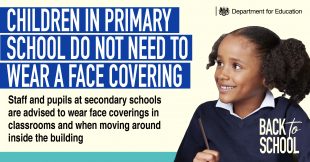
When schools and colleges open to all pupils on 8 March it will be necessary for most secondary school age pupils to wear face coverings but not primary age pupils.
Our guidance is clear that children in primary school do not need to wear a face covering. Face coverings are only necessary for pupils and staff in settings where there are pupils in year 7 and above.
Dr Susan Hopkins and Public Health England officials have strongly advised against primary-age children wearing face coverings as they have difficulties wearing them and keeping them on all day.
It's important that primary schoolchildren don't wear face coverings, says Public Health England's medical adviser Dr Susan Hopkins.
She explains that this is because covid infection rates are low among their age group and wearing face coverings could affect their development pic.twitter.com/HH8a36k6Fo
— Department for Education (@educationgovuk) March 2, 2021
It is also very important for them to see facial expressions to develop their communication and language skills. More information can be found here.
In primary schools, we recommend that face coverings should be worn by staff and adult visitors in situations where social distancing between adults is not possible (for example, when moving around in corridors and communal areas).
Where pupils and students in year 7 and above are educated, we recommend that face coverings should be worn by staff, pupils and students when moving around the premises, outside of classrooms, such as in corridors and communal areas where social distancing cannot easily be maintained. Face coverings do not need to be worn by pupils and students when outdoors on the premises.
In addition, we now also recommend that in those settings where pupils and students in year 7 and above are educated, face coverings should be worn in classrooms and during activities unless social distancing can be maintained. This does not apply in situations where wearing a face covering would impact on the ability to take part in exercise or strenuous activity, for example in PE lessons.
It is vital that face coverings are worn correctly and that clear instructions are provided to staff, pupils and students on how to put on, remove, store and dispose of face coverings in all of the circumstances above, to avoid inadvertently increasing the risks of transmission.
Exemptions
Some individuals are exempt from wearing face coverings. This applies to individuals who:
- cannot put on, wear or remove a face covering because of a physical impairment or disability, illness or mental health difficulties
- speak to or provide help to someone who relies on lip reading, clear sound or facial expression to communicate.
The same exemptions should be applied in education settings, and we would expect teachers and other staff to be sensitive to those needs, noting that some people are less able to wear face coverings and that the reasons for this may not be visible to others.
The use of face coverings is one element of the wider safety measures schools and colleges have put in place This is a temporary measure and will be reviewed at Easter, in partnership with health experts, to decide whether evidence suggests that these measures can be eased ahead of the summer term.
More information on our face covering guidance is available on gov.uk.